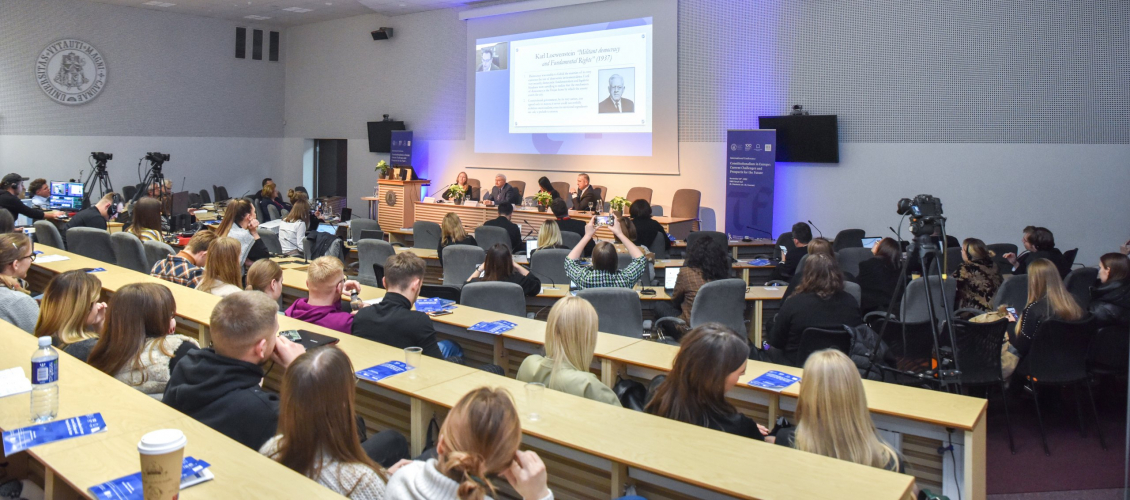The conference marked a number of significant occasions, including the 30th anniversary of the Constitution of the Republic of Lithuania, adopted on the 25th of October 1992, the 100th anniversary of the 1922 Constitution of the State of Lithuania, the 100th anniversary of the University of Lithuania – the predecessor of Vytautas Magnus University, as well as noted the 30th anniversary of the European Humanities University.
The conference brought together more than 20 leading academics, constitutional researchers and practitioners from 16 countries, including Lithuania, Latvia, Estonia, Poland, Italy, Ireland, Hungary, United Kingdom, Kyrgyzstan, Armenia, Ukraine, Sakartvelo, Austria, Belarus, Bulgaria, as well as the Republic of China (Taiwan). The extensive program of the conference, assembled by the EHU Academic Department of Social Sciences, VMU Faculty of Law and International Idea, focused on the concepts and values of constitutionalism, the contemporary challenges to the European constitutional order, as well as assessed national and supranational responses to these challenges.
Opening the plenary session, Prof. Dr. Sergei Ignatov, Rector of the European Humanities University, noted the special role of the European Humanities University in educating the future intellectual elite of Belarus, as well as the broader Eastern European region, so as to enable them to lead the inevitable process of restoration of the democratic constitutional order. The rector reflected on the involvement of the European Humanities University in the promotion of the legal culture and dissemination of human rights values, strengthening of the legal consciousness of the civil society in the Eastern European region.
“We need to continue talking about human rights and, most importantly, keep defending them. We are slowly getting used to the daily news about the horrors of war, the daily arrests of human rights activists, independent media, writers, actors and others who, in the context of today’s events, simply cannot remain silent. It is our duty to remind the world that just 100 kilometers away, in the dark prisons of Belarus, there are too many political prisoners who have dared to protest peacefully against the violation of constitutional human rights” – the Rector concluded.
Speaking on behalf of the European Humanities University, Dr. Aliaksandr Vashkevich, professor at the EHU Social Sciences Department and former Justice of the Constitutional Court of Belarus, discussed the current wording of the Constitution of Belarus, as well as the content of constitutional text. His speech contributed to the panel on the Current Challenges in Rebuilding Constitutionalism.
Panelist of the session on the Future of Constitutionalism, Assoc. Prof. Dr. Ingrida Danėlienė, Head of EHU Academic Social Sciences Department, stressed that the future of constitutionalism lies in the convergence of constitutional identities based on common values, including a friendly attitude towards international law. She stressed that European states have always demonstrated a generally receptive attitude towards international law.
“Lithuanian constitutional law explicitly proclaims its respect and commitment to international law: explicitly and implicitly established interrelated constitutional principles determine the openness of the Constitution towards international law, including European human rights standards. However, a divide between constitutional and international law is, in some spheres, becoming increasingly visible” – Dr. Ingrida Danėlienė highlighted.
According to her, the Constitution, especially the living Constitution, offers a number of mechanisms for the reconciliation of constitutional and extranational provisions.
“Such mechanisms are sufficient for resolving current challenges, including the protection of so-called sensitive, gender-related human rights, as well as future challenges, which will inevitably relate to such processes as climate change and digitalization. However, to this day, not all mechanisms are relied upon equally effectively, while the approach of the Lithuanian Constitutional Court in the last several years has increasingly resembled the “pick and choose” approach towards international law, not always being respectful to human rights, democracy and rule of law standards established therein” – concluded Dr. I. Danėlienė.
More photos are available on Facebook.
